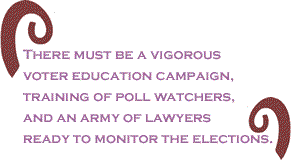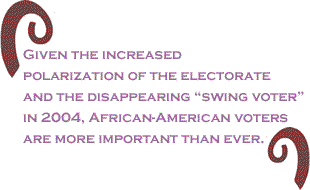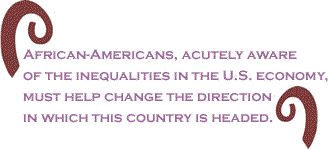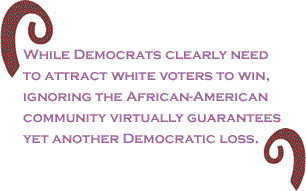
|
|||||||||||||||||||||
|
Carol Moseley Braun’s candidacy for President of the United States is now history. Ambassador Braun, the first African American woman to serve in the U.S. Senate, used her time on the campaign trail to champion issues such as pay equity, single payer health care and economic development. Although her voice and beautiful smile will be missed, African American voters still have a lot of quality candidates to choose from in the coming primary season. With Carol on the sidelines and many of the White Democrats competing for support, civil rights activist Al Sharpton must begin to refocus his energies on winning over undecided African American voters. There is no question that the Democratic Party cannot win without the support of African American voters in 2004, and African-Americans cannot affect the issues most important to them if they do not participate in changing the direction in which this nation is headed. African-Americans are the most loyal block of voters the Democratic Party has, supporting it in numbers that far exceed their percentage of the U.S. electorate. Just look at the numbers. In 1996, Bill Clinton trailed Bob Dole among whites 46 to 43 percent, but got 84 percent of the African American vote and won the election handily. In 2000, Al Gore won an historic 90 percent of the African American vote, which was critical to his success in the popular vote. Given the increased polarization of the electorate and the disappearing “swing voter” in 2004, African-American voters are more important than ever. African American voters have especially forceful reasons to turn out to vote against George W. Bush in 2004. Chief among these is the high unemployment numbers the African-American community has faced over the past 3 years. Corporate earnings may be back up, but the unemployment rate for African-Americans rose to over eleven percent this fall. African-Americans have been particularly affected by job losses in the manufacturing sector, meaning that they will face an even tougher struggle finding new jobs. By reconnecting with its core economic values, the Democratic Party can speak credibly to the failed economic policies of this President.
African-Americans are acutely aware of the conservative part of Bush’s agenda, but are left to wonder where the compassionate part went. Like the banner proclaiming “Mission Accomplished” in Iraq several months ago, the Bush White House is good at crafting images, but not so good at providing the substance behind them. The tax cuts – Bush’s sole economic policy – have certainly not helped African-Americans. During the last round of tax cuts, half of all American families received less than $100 in the mail, a disproportionate number of them African-American. Those Americans in the top one percent of households received more benefits than the bottom 84 percent combined. Bush’s rhetoric of optimism in the American economy has not reduced the record deficits he has caused, and even if GDP growth continues, Bush has still saddled future generations with massive debt. African-Americans already face a tough time getting financing to purchase homes, and more deficit spending inevitably means higher interest rates, hurting African American families even more. The Democrats running for President are all proposing ways to establish tax fairness and restore fiscal sanity by at least repealing tax cuts for the wealthiest Americans. In an era in which all segments of American society should unite behind common causes, many American corporations have betrayed the nation, through fraud, deceit, and greed. To many Americans, especially working Americans, Bush himself is symbolic of the corporate greed and cronyism that has undermined trust in the fairness of America. African-Americans, acutely aware of the inequalities in the U.S. economy, must help change the direction in which this country is headed. One in five African-Americans has no health insurance. The costs for those who do have health insurance continue to rise. African-Americans, more than ever, must ensure that America’s political leaders take action on this ever-growing problem. African-Americans have good reason to challenge other domestic policy failures of the Bush administration. In 2000, Bush promised America that he’d reform education as we knew it. His “No Child Left Behind” initiative did saddle states and local school district with unfunded mandates and strict testing standards, but Bush never provided the resources. Bush imposed new burdens upon states and local school districts and then failed to provide the promised resources to make sure that they could give every child the quality education she deserves. What the Bush Administration has offered is more than 8 billion dollars less than what Congress authorized for NCLB. African-American children, a majority of whom often attends overcrowded classes in dilapidated buildings, deserve better. Their parents take a back seat to no one – Republicans or Democrats – in supporting high standards and accountability. They want highly qualified teachers in their children’s classroom and a bright light focused on how their children are doing. But African-Americans know that real, effective reform can’t be done – as the Bush Administration is attempting to do – on the cheap. Democrats, who have always championed education, must remind African-American voters that they will push real efforts to support and improve our public schools.
African American voters, many of whom did not support war against Iraq, must also question the President’s record on foreign policy. They are right to question the President’s failure to have a plan to rebuild in Iraq and the inexcusable lack of an exit strategy there, and to wonder why America has alienated itself from the rest of the world. Those who believe the Republican Party can make a genuine appeal to African Americans and other minorities cannot overlook this President’s record on race – from the appointment of conservative judges who are not strong defenders of important civil and voting rights remedies of past discrimination, to its failure to invest in America’s urban centers. Still, Democratic candidates must show African-Americans that they stand for equality and opportunity in America. The outcome of the 2004 election is going to be especially close. As the 2002 midterm elections indicated, even slight increases in African-American turn out can be a deciding factor in who wins elections. Yet there may be a tendency by some in the Democratic Party to want to ignore appeals to African American voters in urban areas and the South, and instead go after coveted white suburban types. While Democrats clearly need to attract white voters to win, ignoring the African-American community virtually guarantees yet another Democratic loss. African American voters stood with Bill Clinton – most especially through the darkest days of the impeachment scandal – because African American voters believed with conviction that Bill Clinton stood with them. At the same time, Clinton was able to reach out to white and suburban voters. The choice is not mutually exclusive; the Democratic Party can reach out to all Americans in 2004. The way in which Democrats reach out to African American voters in 2004 is critically important. Drive-by campaigning, in which candidates spend months courting white voters and independents and then spend the last two weeks courting African American voters, is simply not acceptable. Democrats must reach out to African American voters and community leaders now and engage them not just for their votes but to get their opinions about how our future should be shaped. Registering and turning out African American voters is simply vital to the success of the Democratic Party in 2004.
In numerous battle ground states – including Missouri, Michigan, Pennsylvania, Ohio, Tennessee, and Florida – African American turn out is critical for Democratic victory. Voter outreach to African-Americans in 2004 must be done at the grassroots, retail level. Reengaging African American voters will depend on a sophisticated coordination of the presidential campaigns, state parties, local activists and grassroots community leaders. There is definitely a strong case for defeating George W. Bush in 2004. Democrats must work especially hard to sell that case – and to listen to the interests of voters on whom their success depends. The Democratic Party must use its national leaders who are credible champions of issues African-Americans care about to spread the word in 2004. Finally, Democratic victory can be achieved if every vote is being counted. We must demand that states comply with the new Help America Vote Act (“HAVA”) and ensure that minorities are not systematically disenfranchised in 2004. As 2000 indicated, states have a variety of methods of doing just that – by purging voter roles, by discriminatory distribution of antiquated voting machines, and by intimidating voters at the polls. There must be a vigorous voter education campaign, training of poll watchers, and an army of lawyers ready to monitor the elections to ensure that African-Americans are not denied their constitutional rights in 2004.
With the New Hampshire primary behind us, African American must be ready to take center stage in South Carolina, Missouri, Delaware, Michigan and Virginia. After all, these contests take place during Black History Month. This is our moment to make history. Donna Brazile is a Democratic strategist and former Campaign Manager for Vice President Al Gore. |
January
29,
2004 |
|||||||||
|
|||||||||
|
|
|||||||||
| Printer Friendly Version | |||||||||
 |
|||||||||
| |
|||||||||
| |
|||||||||





























